
In economics, a commodity is an economic good or service that has full or substantial fungibility: that is, the market treats instances of the good as equivalent or nearly so with no regard to who produced them. Most commodities are raw materials, basic resources, agricultural, or mining products, such as iron ore, sugar, or grains like rice and wheat. Commodities can also be mass-produced unspecialized products such as chemicals and computer memory.
The oka, okka, or oke was an Ottoman measure of mass, equal to 400 dirhems. Its value varied, but it was standardized in the late empire as 1.2829 kilograms. 'Oka' is the most usual spelling today; 'oke' was the usual contemporary English spelling; 'okka' is the modern Turkish spelling, and is usually used in academic work about the Ottoman Empire.
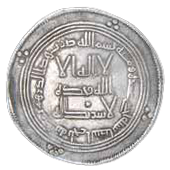
Dirham, dirhem or dirhm (درهم) was and, in some cases, still is a unit of currency in several Arab states. It was formerly the related unit of mass in the Ottoman Empire and old Persian states. The name derives from the name of the ancient Greek currency, drachma.
The batman was a unit of mass used in the Ottoman Empire and among Turkic peoples of the Russian Empire. It has also been recorded as a unit of area in Uyghur-speaking regions of Central Asia. The name is Turkic, but was also sometimes used for the equivalent unit in Persia. The equivalent unit in British India was anglicized as the maund. The value of the batman varied considerably from place to place.

Kemalism, also known as Atatürkism, or the Six Arrows, is the founding ideology of the Republic of Turkey. Kemalism, as it was implemented by Mustafa Kemal Atatürk, was defined by sweeping political, social, cultural and religious reforms designed to separate the new Turkish state from its Ottoman predecessor and embrace a Westernized way of living, including the establishment of democracy, secularism, state support of the sciences and free education, many of which were first introduced to Turkey during Atatürk's presidency in his reforms.

The Tulip Period or Tulip Era is a period in Ottoman history from the Treaty of Passarowitz on 21 July 1718 to the Patrona Halil Revolt on 28 September 1730. This was a relatively peaceful period, during which the Ottoman Empire began to orient itself towards Europe.
The Russo-Crimean Wars were fought between the forces of Muscovy and the Tatars of the Crimean Khanate during the 16th century over the region around Volga River.
The poetry of the Ottoman Empire, or Ottoman Divan poetry, is fairly little known outside modern Turkey, which forms the heartland of what was once the Ottoman Empire. It is, however, a rich and ancient poetic tradition that lasted for nearly 700 years, and one whose influence can still be felt in the modern Turkish poetic tradition.
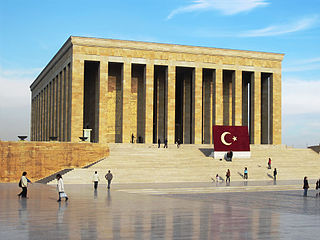
Turkish nationalism is a political ideology that promotes and glorifies the Turkish people, as either a national, ethnic, or linguistic group.

Turquerie was the Orientalist fashion in Western Europe from the 16th to 18th centuries for imitating aspects of Turkish art and culture. Many different Western European countries were fascinated by the exotic and relatively unknown culture of Turkey, which was the center of the Ottoman Empire, and at the beginning of the period the only power to pose a serious military threat to Europe. The West had a growing interest in Turkish-made products and art, including music, visual arts, architecture, and sculptures. This fashionable phenomenon became more popular through trading routes and increased diplomatic relationships between the Ottomans and the European nations, exemplified by the Franco-Ottoman alliance in 1715. Ambassadors and traders often returned home with tales of exotic places and souvenirs of their adventures.

The postal history of Turkey and its predecessor state, the Ottoman Empire, dates to the 18th century when foreign countries maintained courier services through their consular offices in the Empire. Although delayed in the development of its own postal service, in 1863 the Ottoman Empire became the second independent country in Asia to issue adhesive postage stamps, and in 1875, it became a founding member of the General Postal Union, soon to become the Universal Postal Union. The Ottoman Empire became the Republic of Turkey in 1923, and in the following years, its postal service became more modernized and efficient and its postage stamps expertly designed and manufactured.

Spanish–Turkish relations are foreign relations between the Kingdom of Spain and the Republic of Turkey. Spain has an embassy in Ankara and a consulate general in Istanbul. Turkey has an embassy in Madrid and a consulate general in Barcelona.

The steppe and forest-steppe of Ukraine and southern Russia is good agricultural land, but it was traditionally held by pastoral nomads. Any state that could drive off the nomads and fill the land with tax-paying peasants would expand its power enormously. During the period 1500–1800, this region was taken under Russian control.
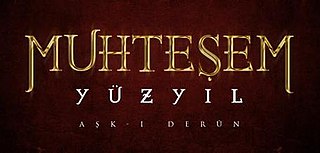
Muhteşem Yüzyıl is a Turkish historical fiction television series. Written by Meral Okay and Yılmaz Şahin, it is based on the life of Ottoman Sultan Süleyman the Magnificent, the longest-reigning Sultan of the Ottoman Empire, and his wife Hürrem Sultan, a slave girl who became a Sultana. It also shines the light on the era known as the sultanate of women. It was originally broadcast on Show TV and then was transferred to Star TV.
The gümrük resmi was a customs charge, or tax, in the Ottoman Empire. In modern-day Turkey the term continues to be in use: Gümrük vergi ve resimleri.
Sürsat was a form of food requisitioning with price controls, used by the Ottoman Empire to provide consumables for its armed forces. It was related to nüzül; sürsat was initially an obligation for the public to provide food and other supplies at a pre-fixed price which was unlikely to be favourable, or might even be merely symbolic. Istira was basically the same obligation, but supposedly at market price. Over time, nüzül, sürsat, and istira were all transformed into extraordinary cash taxes on people living near the route travelled by the army.
Kile or KILE may refer to:
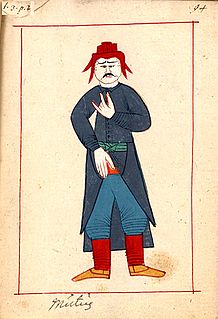
Ottoman Sign Language, also known as Seraglio Sign Language or Harem Sign Language, was a deaf sign language of the Ottoman court in Istanbul. Nothing is known of it directly, but it is reported that it could communicate ideas of any complexity, and that it was passed on to the young through fables, histories, and scripture.
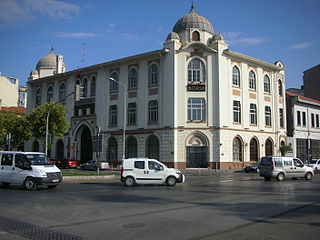
İzmir Commodity Exchange (ICE) is a commodities exchange based in İzmir, Turkey. It was the first commodities exchange established in Turky and focuses on agricultural products. It functions in accordance with the Turkish Law No. 5174 regarding the Union of Chambers and Commodity Exchanges of Turkey and the Chambers and Commodity Exchanges.














